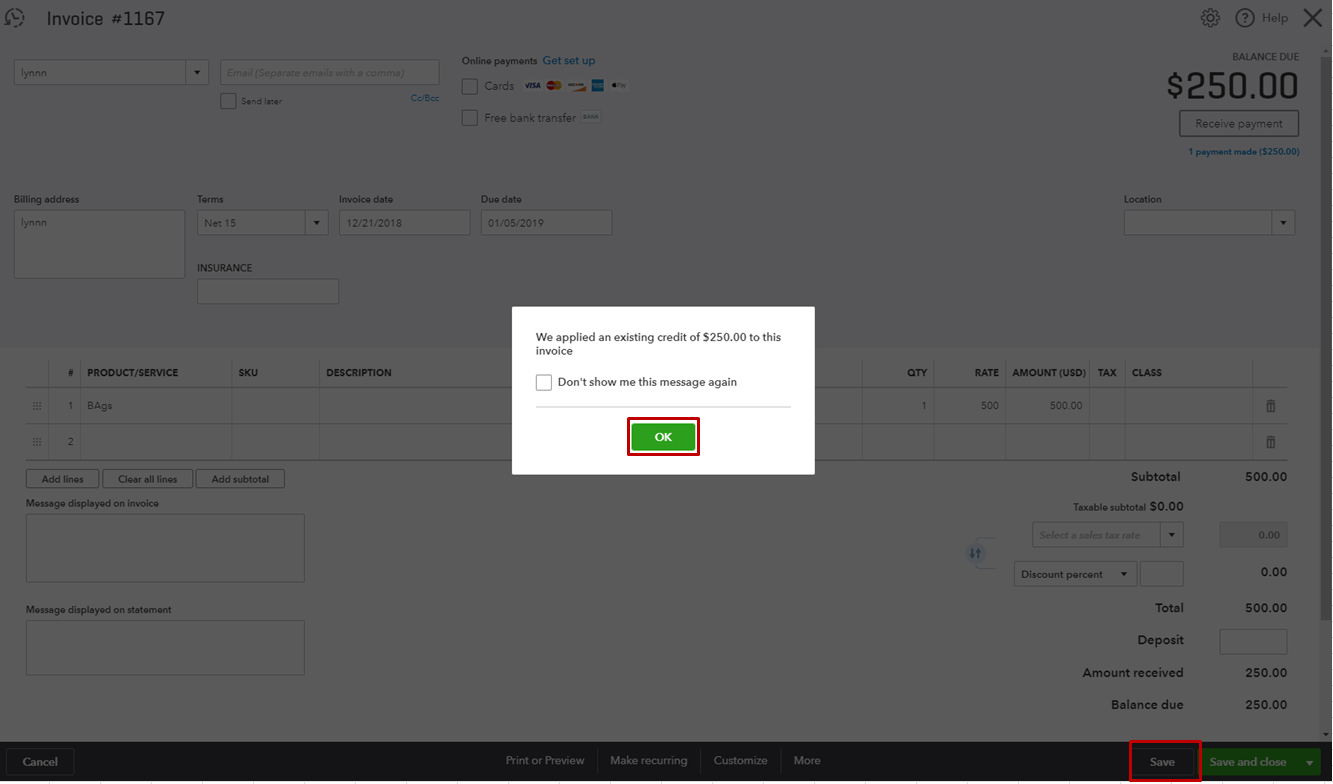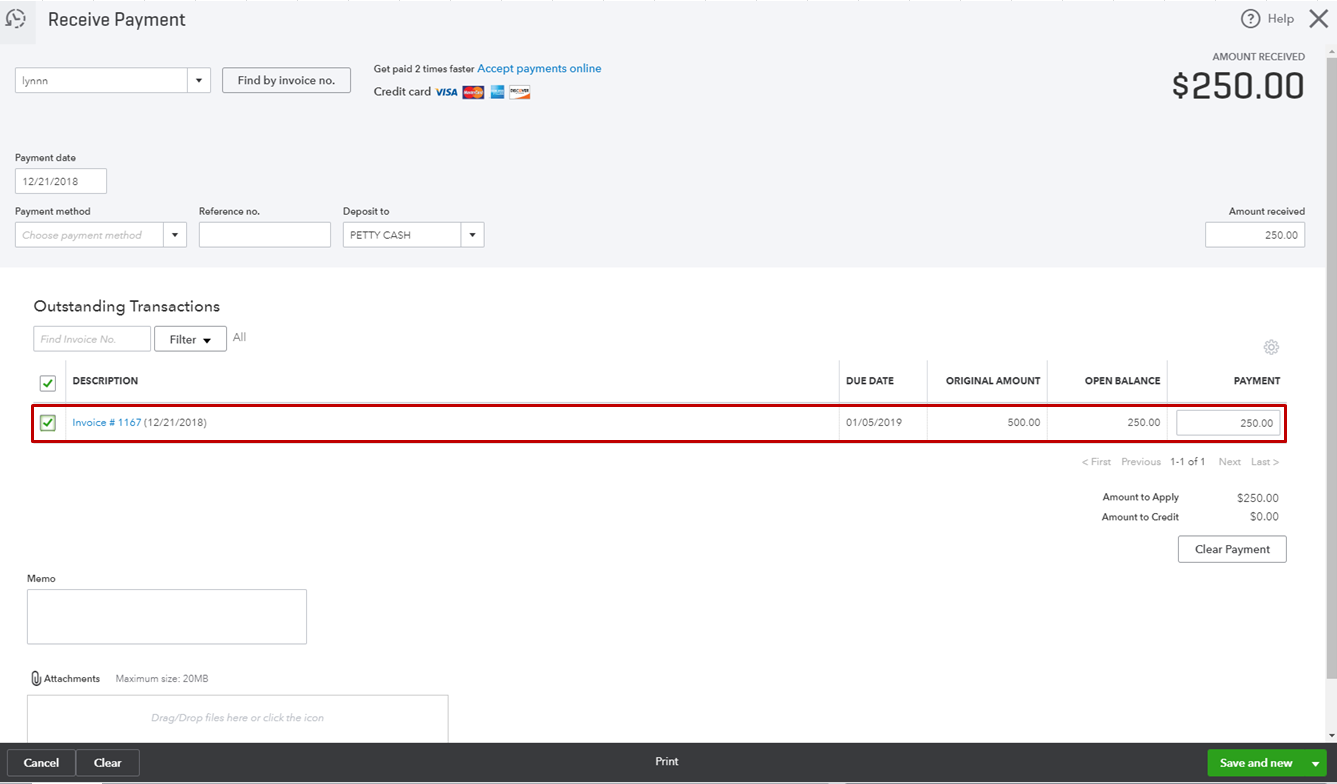- Mark as New
- Bookmark
- Subscribe
- Permalink
- Report Inappropriate Content
What does it mean when my overdue amount for a customer is greater than my open invoices for that same customer?
I have a customer that has never paid full amounts for invoices over the past decade and has a considerable amount currently due and also significantly past due. However, the overdue amount is greater than the open invoices by almost $24k. What does that mean? I am trying to reconcile their account with their office and want to make sure that I am not creating additional problems by submitting my final amount due with accounting errors.
Solved! Go to Solution.
- Mark as New
- Bookmark
- Subscribe
- Permalink
- Report Inappropriate Content
Reports and accounting
- Mark as New
- Bookmark
- Subscribe
- Permalink
- Report Inappropriate Content
Reports and accounting
Example You Invoiced me $5k 90 days ago and I paid $3k. Open Invoice amount is $2k but overdue is $5k
- Mark as New
- Bookmark
- Subscribe
- Permalink
- Report Inappropriate Content
Reports and accounting
- Mark as New
- Bookmark
- Subscribe
- Permalink
- Report Inappropriate Content
Reports and accounting
- Mark as New
- Bookmark
- Subscribe
- Permalink
- Report Inappropriate Content
Reports and accounting
- Mark as New
- Bookmark
- Subscribe
- Permalink
- Report Inappropriate Content
Reports and accounting
- Mark as New
- Bookmark
- Subscribe
- Permalink
- Report Inappropriate Content
Reports and accounting
- Mark as New
- Bookmark
- Subscribe
- Permalink
- Report Inappropriate Content
Reports and accounting
"Overdue is the total of the original unpaid invoice regardless of remaining balance.
Example You Invoiced me $5k 90 days ago and I paid $3k. Open Invoice amount is $2k but overdue is $5k "
That is not how QBO works (assuming <90 day terms, open and overdue both 2k)
- Mark as New
- Bookmark
- Subscribe
- Permalink
- Report Inappropriate Content
Reports and accounting
- Mark as New
- Bookmark
- Subscribe
- Permalink
- Report Inappropriate Content
Reports and accounting
Open includes all invoices even those that are not yet due, less any payments on these invoices. It's the balance on the account.
Overdue is just amounts that are past due.
I don't see how overdue can be greater than the Open amount.
edit: The overdue can be greater if there are unapplied credit memos
- Mark as New
- Bookmark
- Subscribe
- Permalink
- Report Inappropriate Content
Reports and accounting
- Mark as New
- Bookmark
- Subscribe
- Permalink
- Report Inappropriate Content
Reports and accounting
I have renters. I charge a late fee. A tenant pays half on the first but has yet to pay balance. Posted rent is overdue but open balance is half.
It may seem backwards or upside down but that is qb.
- Mark as New
- Bookmark
- Subscribe
- Permalink
- Report Inappropriate Content
Reports and accounting
- Mark as New
- Bookmark
- Subscribe
- Permalink
- Report Inappropriate Content
Reports and accounting
- Mark as New
- Bookmark
- Subscribe
- Permalink
- Report Inappropriate Content
Reports and accounting
- Mark as New
- Bookmark
- Subscribe
- Permalink
- Report Inappropriate Content
Reports and accounting
Thank you! That makes perfect sense now. Total overdue is the total amount billed regardless of the open amount due until the invoice is paid in full.
- Mark as New
- Bookmark
- Subscribe
- Permalink
- Report Inappropriate Content
Reports and accounting
- Mark as New
- Bookmark
- Subscribe
- Permalink
- Report Inappropriate Content
Reports and accounting
- Mark as New
- Bookmark
- Subscribe
- Permalink
- Report Inappropriate Content
Reports and accounting
- Mark as New
- Bookmark
- Subscribe
- Permalink
- Report Inappropriate Content
Reports and accounting
How do you zero it out?
- Mark as New
- Bookmark
- Subscribe
- Permalink
- Report Inappropriate Content
Reports and accounting
Welcome and thank you for joining the thread, @JillP34.
I'm here to help and share some ways to zeroed out the due amount on your open invoices in QuickBooks Online (QBO).
If you have an existing credit memo to your customer, you'll just need to apply it when creating invoices. Here's how:
- Go to the Plus (+) icon.
- Click on Invoice under Customers.
- Fill in the necessary information in the Invoice page.
- Click Save.
- Click OK when asked to apply an existing credit to the invoice.
To zeroed out the open balance, you need to create a payment.
- Click the Plus (+) icon.
- Select Receive Payment.
- Select the customer's name and fill in the necessary information.
- Select an invoice you wanted to pay.
- Click Save and close.
That would allow you to zero out the overdue amount on your open invoices. Feel free to add a comment below if you have any other invoice concerns. Have a wonderful day!
- Mark as New
- Bookmark
- Subscribe
- Permalink
- Report Inappropriate Content
Reports and accounting
@JillP34 wrote:How do you zero it out?
Create a zero Receive Payment, and check the credit against the debit. The date s/be the later date, I think. For the future you can go to Settings and revert back to the default to automatically apply credits
- Mark as New
- Bookmark
- Subscribe
- Permalink
- Report Inappropriate Content
Reports and accounting
open balance is 0 and over due is 14k.
do I always look at over due?
- Mark as New
- Bookmark
- Subscribe
- Permalink
- Report Inappropriate Content
Reports and accounting
Greetings, @Zeb.
You can pull up your Accounts Receivable Aging Detail report. I can add more details about this and guide you how.
Your open balance is showing as 0 because you might have unapplied credit memos. Having unapplied credit memos decrease your open balance.
To view your balances correctly, you can pull up your Account Receivable aging Detail report.In this report, it'll show all your transactions and their balances.
You can follow these steps in pulling up the report:
- Click on Reports from the left panel.
- Look for Accounts Receivable Detail on the search bar.
- Change the Report Period to All Dates.
- Click on Run Report.
If you have open credit memos, you can apply them to your invoices to mark them as paid.
Always know that you can get back to us if you have any other concerns.


